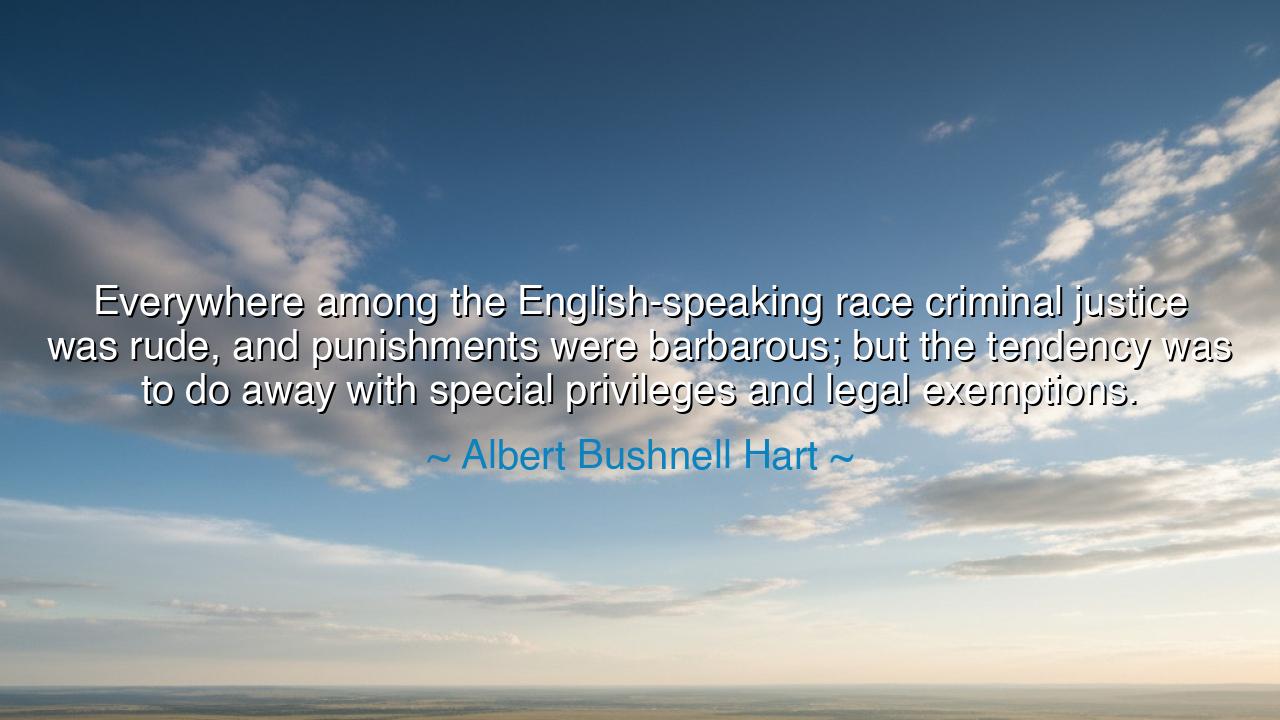
Everywhere among the English-speaking race criminal justice was
Everywhere among the English-speaking race criminal justice was rude, and punishments were barbarous; but the tendency was to do away with special privileges and legal exemptions.






When Albert Bushnell Hart wrote, “Everywhere among the English-speaking race criminal justice was rude, and punishments were barbarous; but the tendency was to do away with special privileges and legal exemptions,” he captured a moment in the long evolution of law, where brutality began to give way to fairness, and the scales of justice, once tipped by class and birth, slowly found their balance. His words shine a light upon the journey of civilization itself — from an age when power alone determined punishment, to an age striving, however imperfectly, for equality before the law. It is a reminder that justice, like the soul of a nation, is not born pure; it is forged through centuries of error, pain, and awakening.
In Hart’s time — the late 19th and early 20th centuries — historians were reflecting on how Anglo-Saxon law had become the backbone of many democratic systems. Yet he does not glorify this heritage. He admits that early criminal justice among English-speaking peoples was rude — meaning rough, crude, and often without mercy. The punishments of those ages — hanging, whipping, branding, even dismemberment — were designed not only to correct but to terrorize. The jails were dark, disease-ridden pits; trials were swift and merciless. But through this darkness ran a single, glimmering thread — the slow abolition of privilege, the idea that no man, however noble, should stand above the law. That thread, once fragile, would one day become the foundation of liberty itself.
Consider the world of medieval England, when lords could claim “benefit of clergy,” when nobles could escape punishment through “trial by peers,” while the common thief or peasant might hang for stealing bread. Yet even within that hierarchy, seeds of change were being sown. The Magna Carta of 1215 — that ancient charter forced upon King John — declared that “no free man shall be imprisoned or stripped of his rights, except by the lawful judgment of his equals or by the law of the land.” Though its protection at first extended only to a privileged few, the spirit of its words would grow stronger through the centuries, reaching outward until it embraced all people, regardless of rank.
This is the evolution Hart speaks of — the slow humanization of justice. The English-speaking world, with all its cruelty, carried within it a restless conscience. In the 17th and 18th centuries, thinkers like John Locke and William Blackstone began to teach that punishment should serve reason, not revenge. The law, they said, should be the great equalizer, not the weapon of the powerful. From these ideas sprang trial by jury, habeas corpus, and the belief that every accused person had rights that even kings could not deny. The road from barbarism to fairness was long and paved with suffering, but it was a road that led humanity closer to justice.
History gives us countless tales of this transformation. In the old days, a man could be hanged for stealing a horse, while another could commit murder and be spared through noble blood or political favor. But over time, the cries of reformers changed the world. Sir Samuel Romilly, in early 19th-century Britain, fought to abolish the death penalty for minor crimes. His struggle was mocked by many, but his cause prevailed — and through his courage, the law took one step closer to mercy. His victory stands as a testament to what Hart described: the tendency to end special privileges and to elevate law from a tool of dominance to an instrument of moral order.
Yet Hart’s words are also a warning. Civilization is not a permanent state; it is a fragile achievement. The barbarous spirit he describes — the desire to divide, to privilege the few, to justify cruelty in the name of order — still lingers in every age. The progress of justice can be undone when people forget that equality before the law is the cornerstone of freedom. For when the law bends for some, it ceases to be law — it becomes oppression dressed in legal robes.
Therefore, let this truth be carried forward: Justice must never be static; it must be ever rising, ever refining, ever purging itself of privilege. We must remember that fairness does not blossom overnight, nor does it survive without tending. The duty of each generation is to look upon its own laws and ask, “Do they still serve equality, or do they serve power?” As Hart reminds us, even in the most barbarous times, the tendency of the human heart is toward fairness. And so long as that spirit endures — in courts, in communities, and in the conscience of humankind — civilization will continue to climb toward the light.






AAdministratorAdministrator
Welcome, honored guests. Please leave a comment, we will respond soon